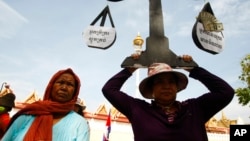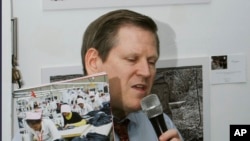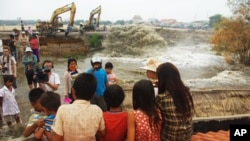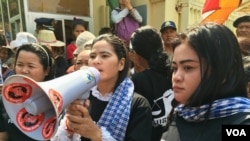Land and human rights activists have reacted with shock at the World Bank’s announcement last week that it would resume lending to Cambodia following a nearly five-year moratorium on new loans.
The bank announced last Thursday that it would supply Cambodia with $130 million for poverty reduction programs in a statement, including for a controversial land concession project that could see villagers in Kampong Thom province forcibly relocated.
It placed a hold on new lending in August 2011 after criticism over its involvement in a land titling scheme for some 3,000 residents off Boeung Kak lake in Phnom Penh, who were evicted to make way for a development project owned by a ruling Cambodian People’s Party senator.
“It’s frankly shocking that the World Bank has decided to resume aid and assistance to Cambodia right as the government is in the middle of one of the worst crackdowns on human rights in recent memory,” said Phil Robertson, deputy director of Human Rights Watch's Asia division.
“The indication is that the World Bank doesn’t care about human rights, the World Bank is going to allow this lending to go forward and resume programs rather than be concerned about the deteriorating human rights situation and the lack of any sort of significant solution for the crisis of land and rights that started this whole process of Cambodia versus World Bank issues in the first place,” he said.
“I am sure they will claim that there are various different reasons and there are various different criteria that were met by the Cambodian government to justify resuming lending but the political message is all bad.”
The Bank’s 2016-2017 Country Engagement Note (CEN) for Cambodia was approved at a meeting of the board last week, allocating financing for four projects to provide many communities across Cambodia with better roads, sustainable sources of water, improved livelihoods from agriculture, and increased access to health care.
The four projects will be supported by $130 million in concessional credits from International Development Association. Repayments are stretched over 25 to 40 years, including a grace period of five to 10 years.
“Our new engagement with Cambodia starts with projects aimed to bring tangible benefits for Cambodians,” Ulrich Zachau, country director of the World Bank for Southeast Asia, said in a statement. “We will help finance projects to make health care more affordable, improve roads, and support poor villagers who depend on agricultural livelihoods and fishing. We will also continue our close partnership with Cambodia to share international experience and help build local capacity, strengthen institutions and improve governance.”
Of the $130 million, $25 million be spent on health care, $60 million will go towards improving the road system, $15 million for a Mekong Integrated Water Resources Management project, $25 million go towards the controversial Land Allocation for Social and Economic Development Project II, and $30 Million on Health Equity and Quality Improvement.
In early 2007, the Cambodian government granted a 99-year lease to private developer Shukaku, Inc., over a 133-hectare area of central Phnom Penh to turn the lake into a commercial, tourism, and residential complex.
Shukaku, which is owned by ruling party Senator Lao Meng Khin, a close associate of Prime Minister Hun Sen, had forcefully evicted more than 3,500 families from the site. The World Bank that found it had violated its own policy as it funded the projects related to the lake, freezing lending and saying it would not resume until a solution was reached with the complainants.
Tep Vanny, a prominent Boeeung Kak activist, said the decision to resume lending while many of those families were without an agreeable settlement had caused “disappointment, suffering, and [it had] betrayed its promise.”
“Now the bank changes its will mind and it does not take a stance anymore. It is giving the government money when we have no solution, and we have been suffering for almost 10 years,” she said.
“The money turns into a weapon to mistreat us and we live a life of suffering.”
Eang Vuthy, executive director of Equitable Cambodia, which has worked closely with displaced urban communities, said he was surprised at the bank’s decision.
“We, as civil society, are waiting to see whether the bank is taking any action to solve the issues for the people who were affected by its previous projects,” he said.










